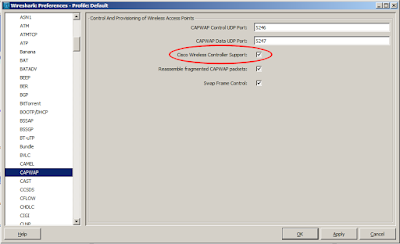Decoding Cisco CAPWAP With Wireshark

Here's an interesting little gotcha I wasted a few hours on recently... I have been looking at QOS on a Cisco WLC and was looking at DSCP markings in CAPWAP packets between a Cisco WLC and access point. I did this by spanning the switch port that the AP is connected to and then using a copy of Wireshark on another switch port to capture the traffic so that I could have a look through it. However, when I looked at the CAPWAP frames, Wireshark was reporting most of the CAPWAP packets as being "Association Requests" and that they were "[Malformed Packets]". After testing this in quite a number of versions of Wireshark (assuming a Wireshark decode bug), I finally gave up and reported a bug to the guys at Wireshark. They were incredibly quick to respond and diagnosed the issue very quickly! It turns out that Cisco have not implemented the final draft of CAPWAP (according the guys at Wireshark), and that there is an option in Wireshark for Cisco CAPWAP support...
